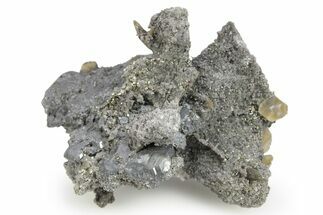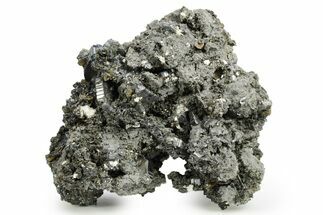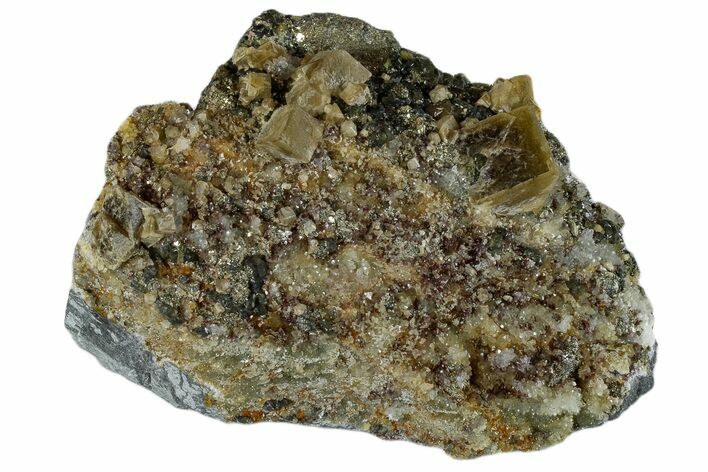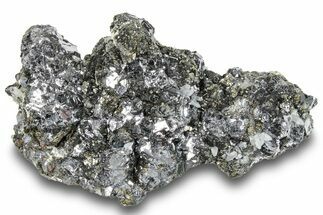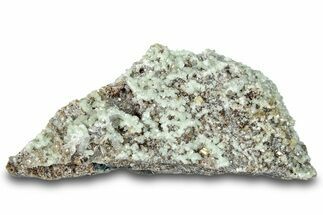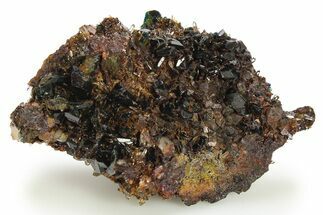This Specimen has been sold.
3.8" Lustrous Siderite Crystal Cluster on Quartz - Peru
These are lustrous brown rhombohedral siderite crystals that formed from a quartz crystal encruste, pyrite-rich matrix, collected from the Julcani Mine in Huancavelica, Peru. There also appear to be small yellow sphalerite crystals peppered throughout the specimen.
It comes with an acrylic display stand.
It comes with an acrylic display stand.
Siderite, also known as "chalybite", is an iron carbonate mineral that belongs to the calcite group. It can contain a wide variety of impurities, including manganese, magnesium, calcium, zinc, and cobalt. Brown hues are typical for siderite, though occasional specimens can be white and gray. It can occur as rhombohedral crystals with rounded faces, and as scalenohedral crystals in rare cases. Botryoidal, concretionary, massive, stalactitic, and mammillary are some of the more common formations of siderite.
Since siderite is such a prevalent mineral, it can be found all around the world in a wide variety of colors and formations. The Morro Velho Mine in Minas Gerais, Brazil is noteworthy for producesing beautiful gemmy siderite specimens. The crystals collected from here are often translucent yellow-green in color, and form in association with dolomite, cubanite, pyrrhotite, and chalcopyrite.
The chemical formula of siderite is FeCO3, with the variable formula including manganese, magnesium, calcite, zinc and cobalt ((Fe,Mg,Ca,Mn,Zn,Co)CO3).
Since siderite is such a prevalent mineral, it can be found all around the world in a wide variety of colors and formations. The Morro Velho Mine in Minas Gerais, Brazil is noteworthy for producesing beautiful gemmy siderite specimens. The crystals collected from here are often translucent yellow-green in color, and form in association with dolomite, cubanite, pyrrhotite, and chalcopyrite.
The chemical formula of siderite is FeCO3, with the variable formula including manganese, magnesium, calcite, zinc and cobalt ((Fe,Mg,Ca,Mn,Zn,Co)CO3).
About Quartz
Quartz is the name given to silicon dioxide (SiO2) and is the second most abundant mineral in the Earth's crust. Quartz crystals generally grow in silica-rich environments--usually igneous rocks or hydrothermal environments like geothermal waters--at temperatures between 100°C and 450°C, and usually under very high pressure. In either case, crystals will precipitate as temperatures cool, just as ice gradually forms when water freezes. Quartz veins are formed when open fissures are filled with hot water during the closing stages of mountain formation: these veins can be hundreds of millions of years old.
Quartz is the name given to silicon dioxide (SiO2) and is the second most abundant mineral in the Earth's crust. Quartz crystals generally grow in silica-rich environments--usually igneous rocks or hydrothermal environments like geothermal waters--at temperatures between 100°C and 450°C, and usually under very high pressure. In either case, crystals will precipitate as temperatures cool, just as ice gradually forms when water freezes. Quartz veins are formed when open fissures are filled with hot water during the closing stages of mountain formation: these veins can be hundreds of millions of years old.
SPECIES
Siderite, Quartz & Pyrite
LOCATION
Julcani Mine, Julcani District, Angaraes Province, Huancavelica, Peru
SIZE
3.8" wide
CATEGORY
ITEM
#173412
 Reviews
Reviews
